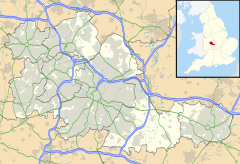Aston
| Aston | |
|---|---|
| Aston shown within the West Midlands | |
| Population | 32,286 (2011.Ward) |
| • Density | 10,833 mile² (4,185 km²) |
| OS grid reference | SP072889 |
| Metropolitan borough | |
| Metropolitan county | |
| Region | |
| Country | England |
| Sovereign state | United Kingdom |
| Post town | BIRMINGHAM |
| Postcode district | B6 |
| Police | West Midlands |
| Fire | West Midlands |
| Ambulance | West Midlands |
| EU Parliament | West Midlands |
| UK Parliament | |
Aston is an area in Central Birmingham, in the West Midlands of England. Commencing immediately to the north-east of the city centre, Aston constitutes a ward within the unitary authority.
Aston was first mentioned in the Domesday Book in 1086 as "Estone", having a mill, a priest and therefore probably a church, woodland and ploughland. The Church of SS Peter & Paul, Aston was built in medieval times to replace an earlier church. The body of the church was rebuilt by J. A. Chatwin during the period 1879 to 1890; the 15th century tower and spire, which was partly rebuilt in 1776, being the only survivors of the medieval building. The ancient parish of Aston (known as Aston juxta Birmingham) was large. It was separated from the parish of Birmingham by AB Row, which currently exists in the Eastside of the city at just 50 yards in length. It was partly included in the borough of Birmingham in 1838, and a further part, Saltley was added in 1891.
Old buildings which became popular within Aston included the Aston Hippodrome and the Bartons Arms public house. Gospel Hall on Park Lane was opened in 1892 and demolished in the 1970s to be rebuilt at the top of Park Lane in 1979. The original hall had a seating capacity of 73. Another meeting place was the Ellen Knox Memorial Hall which was next door to the Midland Vinegar Brewery. The brewery was owned by the Midland Brewery Company was built around 1877. It was located on Upper Thomas Street. The brewery was a three storey brick building with rounded corners and semi-circular windows. The roof was slated. Other industry that was located in Aston include the Premier Motor Works which produced cars during the early 20th century. The works were situated at the junction of Aston Road and Dartmouth Street. On Miller Street was a tramcar depot which had a storage capacity of 104 tramcars. It opened in 1904.
...
Wikipedia

